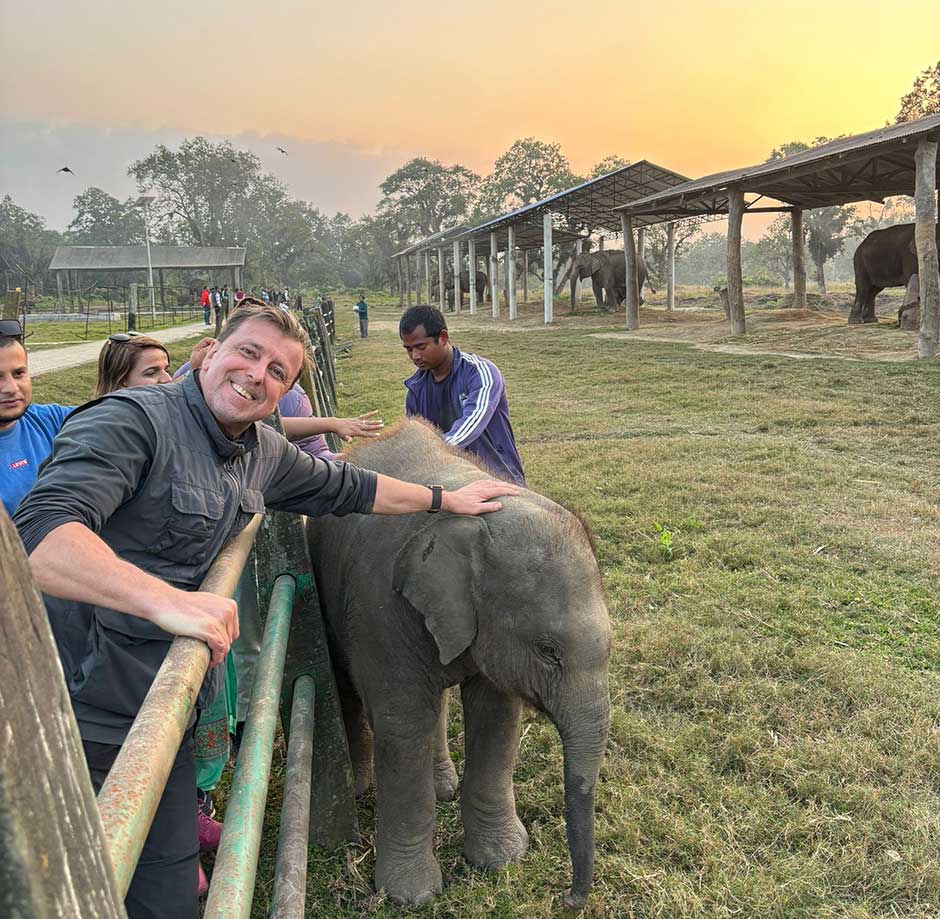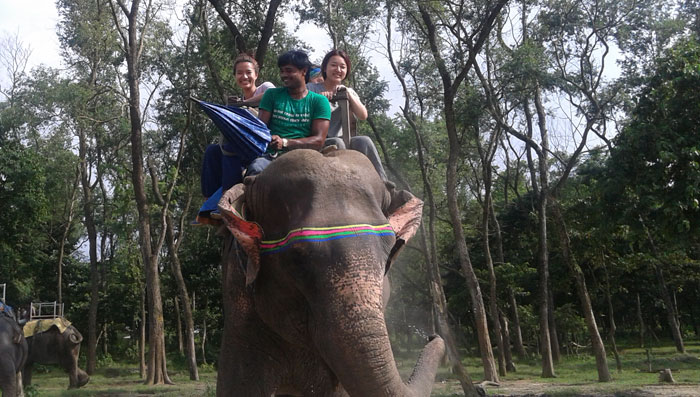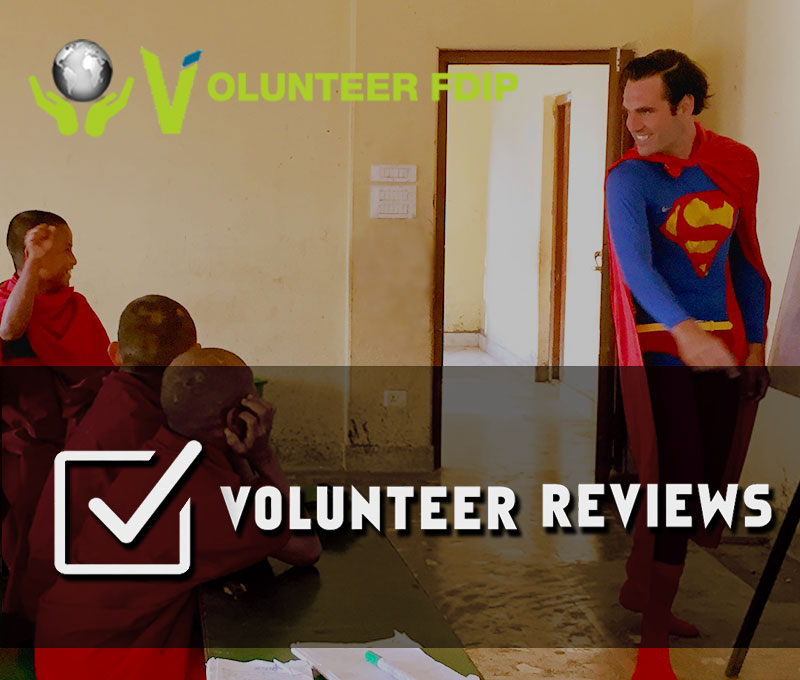
Volunteer work with Elephants
Follow FDIP @twitterElephants are important cultural symbol in Asia. They are regarded as a symbol of god Ganesh and respected for their peaceful nature and intelligence. Exploring the lives of these Asian giants can be an opportunity of lifetime. Elephants eat around 550 pounds every day and drink about 200 liters of water. And they need to eat frequently as they can digest very few percentage of their total consumption. An elephant loves swimming and it has to be taken for bath each day.
Studying elephant's days, helping prepare their food and discovering their nature and social life be a memorable experience for every volunteer. Besides elephant itself, studying the social and cultural impact of this beast in many areas of Nepal can be an incredible experience. Elephant dung paper of Chitwan, is one example. Beholding the process of making paper from elephant dung and reflection of such paper products around the town will fascinate you.
Fees
| Registration fee | US$ 169 |
Program fee
| 1 week | US$300 |
| 2 weeks | US$400 |
| 3 weeks | US$500 |
| 4 weeks | US$600 |
| 5 weeks | US$700 |
| 6 weeks | US$800 |
| 7 weeks | US$900 |
| 8 weeks | US$1,000 |
| 9 weeks | US$1,100 |
| 10 weeks | US$1,200 |
| 11 weeks | US$1,300 |
| 12 weeks | US$1,400 |
* Convert these fees in your currency From Here.
* Fees for the group volunteering will be decided by our project officer depending on the size and nature of group.
- Registration fee include
- Volunteer FDIP staff support
- Communication,marketing and web cost of FDIP
- Arrangement of host family or placement.
- Program fee include
- Transportation from airport to placement
- Orientation cost of volunteer
- Contribution to host family
- Food and accomodation
- Emergency support
- Program fee exclude
- Airfares and visa charge
- Travel Insurance
- Bevarages extra food and laundry
- Recreational activities
- Any other personal needs
- Daily transportations
Skills and Qualifications to Volunteer
Volunteering in wildlife conservation project requires visiting wildlife and remote areas. Though specific skill or qualification is not required for this project, you should prepare yourself physically and mentally for wildlife and national park.
Orientation
1 day orientation is held by our local staffs in Kathmandu. Volunteers are introduced to basic Nepali language and greets, meanwhile they are also informed about the local customs, safety, travel guidance and all the dos and don'ts in the Nepali Society. You will be provided contact details of our local office, maps and other useful information.
Volunteers will be then informed about their destination conservation areas their responsibilities as a volunteer and how they are going to going to assist with the conservation workers there.
Arrangement of Elephant project depends on the season and the weather conditions.Volunteers' Roles and Duties
Your role and duties as volunteer for elephants will be as follows:
- Observe elephant caring techniques, elephant related equipment management and assist mahout.
- Learn elephant signs, psychologies and language
- Learn how to make elephant diet (Kuchi)
- Visit the sites of grazing or grass collection areas of elephant and note the varieties of grasses used for elephants and analyze current status of vegetations.
- Visit Elephant Dung Paper making sites and elephant breeding farm
Food & Accommodation
Volunteers will be received at airport by our local staff. Volunteer are accommodated in our hostel for 1 day till the orientation. Volunteers are then accommodated at homestays(hotels).
You will be provided basic living standard with clean room, pure drinking water, hygienic food, bathroom and shower. Volunteers might share their room with other co-volunteers. Local meal in Nepal is Daal Bhaat, consisting of beans curry( daal),steamed rice(bhaat), vegetables, pickles and occassionally chicken or meat.
If you have any health issue and special dietary requirements please inform us while applying for the project. It will be tried to fulfill your all hygienic and nutritional requirement in meal but as a volunteer we will also be expecting some flexibility from you. FDIP considers your Food and Accommodation as an integral part of the efficiency for your activities while volunteering in Nepal. So FDIP team will take care of that.
Why Volunteer With Elephants in Nepal

If you are wondering to contribute your time to volunteer for animals, at the same time observing the different angles of wildlife and environment conservation then volunteering in Nepal for elephants is one of the opportunities you would not want to miss. While working with these Asian giants you will be creating a new environment for them to run freely. You'll wash, walk with, and wash the elephants. You’ll observe them in their natural environment. You’ll understand their world and you will understand their language & signs. Every aspects of this volunteering project will be so real that you'll find yourself indulged in this fascinating experience. You will know that you have made a real difference in the life of these elephants. That you've been able to care for and have been able to nurture them and it will be such a rewarding feeling.
This project of FDIP is based on Chitwan, Nepal. Chitwan national park is located in the plain land of central Nepal and is one of the famous destinations for Asian wildlife explorers. Whilst talking about Chitwan National Park, It is the first National Park of Nepal established in year 1973 as a Royal Chitwan National Park and listed as world heritage site in year 1984, Around 65 species of mammals, 544 species of birds and 126 species of fish have inhabited in this park. It is significantly renowned for one horned rhinos, royal Bengal tigers and crocodiles.
Although there are various species to be studied here, one of the prominent kind in the area is the Giant Asian Elephants. Wild elephants enjoy diverse animal’s rights because they are owned by nature, Government elephants’ are owned by Nepal government; used by Nepal army; occasionally used for commercial purpose and private elephant are owned by public personal for commercial use basically for elephant safari and carrying loads. In chitwan numerous debates has been made in the ground of elephants’ rights. The owner of commercial elephants’ also admit that private elephant is facing more challenge in compare to government elephant and their hand full challenge are not enough land to make them chain free and inadequate supply of quality food for them which lack them to enjoy their right.
From year 1990 elephants were brought in business widespread with the motto of enhancing tourism by providing opportunities to take elephant ride for every visitor and in some extent they succeeded. With the change in the times lap the challenge in the name of animals rights come out. Somewhat government managed it with self owned government elephant whereas commercial elephant is very far to meet this challenge. Commercial elephants are still tied in chain and good food source is still lacking.
At present private elephant are used for elephant safari in national park of Chitwan however government elephant are used for monitoring park by safeguard of animals and visitors. Elephants need a bit more care and feeding. As elephants of Chitwan are maintaining a considerable portion of the economy taking care of them is a big responsibility that comes on hand. While volunteering to take care of these Asian beasts, a participant will have opportunity to support the mahouts for the regular task Mahouts are the guardians of elephant they care and pamper them and being an assistant of mahout you’ll have chance to build and unforgettable bonding with this beast.
To preserve the maximum possible animal rights for the elephants of Chitwan it is essential to provide them intensive care and treatment. Monitoring the grazing practices for the elephants can be a access to study the environmental impact of elephants in Chitwan.
Changes cannot be made in one night it is phenomenon process and it takes time, to make a difference we need participation. And being an elephant volunteer is a window to enter the world of the Asian Elephants. There are various elements of volunteering. Among them, working with elephants is one of the most interesting angles to volunteer abroad. If you want to get insight of the Asian Wildlife and also interested to explore the environmental facet of an animal behavior then elephant volunteer project is right one to choose.
So there is no particular answer for why you should try this volunteer abroad experience. Or why you should spare some time for these wild beasts from your busy schedule. It is just like sometimes we do things to make it feel better by making a difference in life of a creature. Volunteering with elephants can be a doorway to generate those feelings. Elephants are very intelligent and they quickly bond with their caretakers. They easily allow you to enter their world therefore participating in elephant volunteering project will enable you to enter a new territory of animal kingdom.
Please click here to get the complete details on available programs, volunteer’s roles and activities , accommodation, cost, visa , vaccination, airport arrival and the rest of it.
Get More Info Now »










